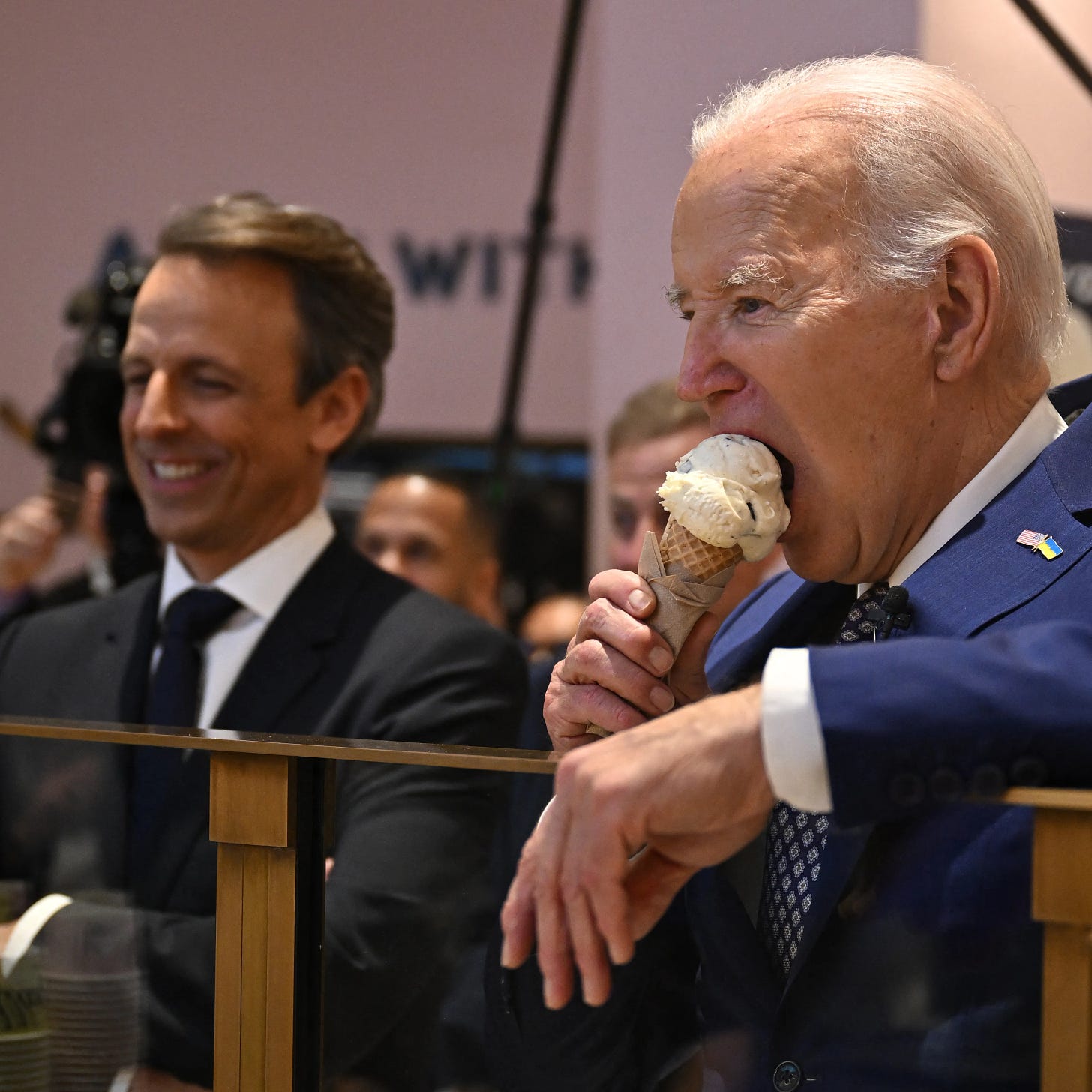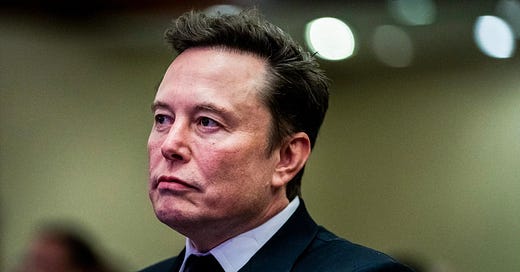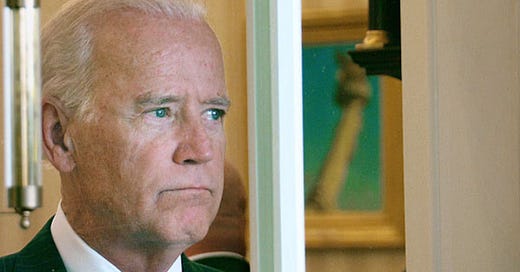
Why (some) Democrats are fixated on Biden's age
Trump's competitiveness is a mystery; Biden's age is a convenient fall guy
President Biden will deliver his State of the Union address tonight, and since coverage of that will very likely be focused not on what he proposes or how he describes the conditions of the country, but rather on how well he has addressed “the age issue,” I want to pre-register some thoughts here. The ongoing obsession with Joe Biden’s age continues to mystify me, but I’m increasingly thinking the reason for it is that, as in 2016, Donald Trump is more popular than he should be, and political observers need something to blame for that. Biden’s age, in this sense, is doing the work that Hillary Clinton’s e-mails or her speaking style or use of identity politics did back in 2016. It’s not the cause, but it’s a convenient scapegoat.
As I’ve written previously, the idea of “electability” is a particularly Democratic obsession; Republicans do not really stew over it (and indeed could probably stand to worry about it a bit more). Democrats, broadly speaking, are pretty sure they can spot an “electable” candidate — e.g.: someone who can win swing voters in Wisconsin and Michigan — or, if not, they are very sure they can spot someone who isn’t electable.
Electability is a deeply problematic concept. It often overlaps with race and gender — many political actors are convinced that women and people of color do worse in elections even in times and places when they don’t. Sometimes there’s a hint of data involved, as in the polls showing how different candidates would do against the other party’s nominee in November. But oftentimes it’s just vibes informed by prejudices.
Joe Biden was a huge beneficiary of this in 2020. Polling studies suggested that there were quite a few Democratic voters that year who preferred Elizabeth Warren or Bernie Sanders or Kamala Harris or Cory Booker but backed Joe Biden instead precisely because they thought he, and only he, could defeat Donald Trump. Now many of those same people believe that Biden no longer has electability on his side, and they’re pining for the Democrat who does.
(The gorgeous irony, of course, is that Joe Biden is the one person on the planet who has ever actually defeated Donald Trump in a general election. He is literally electable, in the sense that he has already done this precise job. But he has rarely gotten much credit for that.)
Now, Donald Trump is not a particularly popular presidential candidate — he never won a majority when running for president and never had approval ratings over 50% — but it is a legitimate mystery for many observers why he isn’t far less popular. Just to name a few things that we would generally think matter:
He very poorly managed a pandemic, needlessly and dangerously polarizing and undermining the country’s response and leading to one of the highest mortality rates of any advanced economy. 400,000 Americans died from the illness on his watch during his final year in office.
He openly organized a violent insurrection after his defeat, breaking the nation’s tradition of peaceful transfers of power.
He has called for the termination of the Constitution (his words) to return him to power.
He has vowed he will assume dictatorial powers for at least part of his next term.
He has promised to massively defund K-12 education across the country unless schools end vaccine requirements.
Obviously I could list more. But the point is, most political observers are still living under the fiction that these sorts of things are electoral poison. As I would hope we would have learned by now, they are not poison on their own. What usually happens when a candidate or elected official does something egregious is that their party stops defending them and the ensuing media frenzy creates conditions so dreadful that they’d rather leave politics than continue to endure it.
Two important things set Trump apart from other politicians: 1) His party is afraid to publicly criticize him, due to his influence in primary elections; and 2) He is not at all bothered to be at the center of multiple scandals every day. Combined with the intense polarization of the electorate, these things set conditions where Trump will just never lose Republicans nor gain Democrats, and thus his approval rating remains low but one of the most stable in polling history.
The lesson for many political observers is that the rules just don’t apply to Trump; my read has long been that the rules just don’t apply generally. We like to think that promising to be a dictator will fatally damage a campaign, but this ignores quite a few dictators who have won office through democratic means. It’s not nearly as damaging a campaign pledge as we’d like to think. We’re just convinced that Trump should be less popular, and when he’s not, we blame his opponents.
This same thing was mystifying political observers in 2016. It made no sense that, after all Trump did that year (insult Gold Star families, attack John McCain for being a POW, call Mexicans rapists, brag about sexual assault, etc.), he was somehow still a presidential contender. So eventually it became Hillary Clinton’s fault. She campaigned wrong, she was off-putting, she mismanaged e-mails, etc. And when she lost, many just knew that Bernie (or someone else) Would Have Won, that she was somehow the only Democrat who could have lost to Trump.
And now here we are again, blaming Biden for the fact that Trump is somehow still in politics and has an approval rating higher than two. It can’t be that around 40-45 percent of the country actually likes the things that Trump says, it can’t be that the things we think are death to campaigns aren’t, so it has to be something about Biden. Let’s go with his age.
As Julia Azari and I wrote, the idea that Trump has some kind of magic hold over the electorate is one of the more persistent incorrect lessons of the 2016 election. Not only does it distort our views of what Trump is capable of, but it distorts our views of what his opponents are responsible for. Instead of seeing the rules of politics as toothless, we think they apply to everyone but Trump, and we blame them (Jeb Bush, Hillary Clinton, Ron DeSantis, etc.) and mock them for being unable to defeat such a flawed candidate.
My read on Biden’s unpopularity is that it has far more to do with the overall political and economic environment than anything about him personally, and that if Democrats somehow managed to replace him as their presidential nominee that person would have similar, if not lower, levels of support. And further, that pushing out someone who has been a remarkably skilled coalition manager within the party risks alienating parts of that coalition in dangerous ways. But I also believe this is a largely academic discussion; he is functionally the party’s nominee for 2024, and the general election will be close, as they all are.
In as polarized a system as we have, Biden’s age is not a major factor. Unless Democrats insist on believing it is.

















Tedious worrywart Democrats. I get it--Trump shouldn't be competitive. But he is--that's our country right now. The answer is "get to work" not "egads, whatever shall we do." God save me from the fretters and doomsayers.
Maybe the real culprit is the misinformation ecosystem that makes half the country believe things that seem absurd to the rest of us.